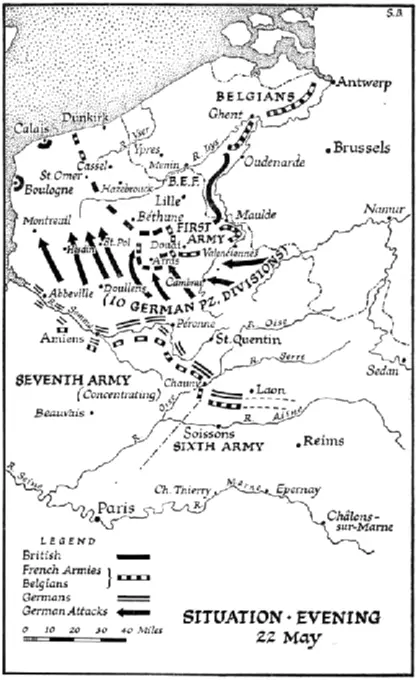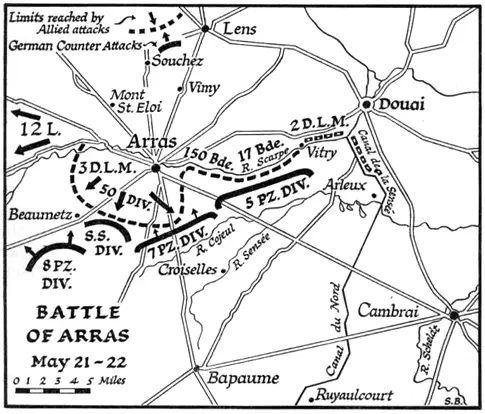were put on half rations. The impression of French helplessness derived from many sources led me to protest to Reynaud.

Prime Minister to M. Reynaud.
(Copy to Lord Gort.) | 23.V.40. |
Communications of Northern Armies have been cut by strong enemy armoured forces. Salvation of these armies can only be obtained by immediate execution of Weygand’s plan. I demand the issue to the French commanders in north and south and Belgian G.H.Q. of the most stringent orders to carry this out and turn defeat into victory. Time is vital as supplies are short.
I reported this message to the War Cabinet when they met at 11.30 A.M., pointing out that the whole success of the Weygand plan was dependent on the French taking the initiative, which they showed no signs of doing. We met again at 7 P.M.
And the next day:
Prime Minister to M. Reynaud, for General Weygand. | 24.V.40. |
General Gort wires that co-ordination of northern front is essential with armies of three different nations. He says he cannot undertake this co-ordination, as he is already fighting north and south and is threatened on his lines of communications. At the same time, Sir Roger Keyes tells me that up to 3 P.M. today (23d) Belgian Headquarters and King had received no directive. How does this agree with your statement that Blanchard and Gort are main dans la main? Appreciate fully difficulties of communication, but feel no effective concert of operations in northern area against which enemy are concentrating. Trust you will be able to rectify this. Gort further says that any advance by him must be in the nature of sortie, and that relief must come from south, as he has not (repeat not) ammunition for serious attack. Nevertheless, we are instructing him to persevere in carrying out your plan. We have not here even seen your own directive, and have no knowledge of the details of your northern operations. Will you kindly have this sent through French Mission at earliest? All good wishes.
* * * * *
Some account of the small battle fought by the British around Arras must be given here. General Franklyn, who commanded, intended to occupy the area Arras-Cambrai-Bapaume. He had the 5th and 50th British Divisions and the 1st Army Tank Brigade. His plan was to attack with this armour and one brigade of each division, the whole under General Martel, round the western and southern sides of Arras, with an immediate objective on the river Sensée. The French were to co-operate with two divisions on the east to the Cambrai-Arras road. The British divisions consisted of only two brigades each, and the tanks numbered sixty-five Mark I and eighteen Mark II, all of whose tracks, the life of which was short, were wearing out. The attack began at 2 P.M. on May 21, and soon found itself engaged with much stronger opposition than was expected. French support on the eastern flank did not materialise, and on the western was limited to one light mechanised division. The enemy armour actually consisted of about four hundred tanks of the 7th and 8th German Armoured Divisions, a general named Rommel commanding the former.

At first the attack prospered, and four hundred prisoners were taken, but the line of the river Sensée was not reached, and the German counter-attack in overwhelming numbers with full air support caused heavy casualties. The 12th Lancers presently reported strong enemy columns moving towards St. Pol and threatening to turn the western flank. During the night the Army Tank Brigade, the 13th Brigade of the 5th Division, and the 151st Brigade of the 50th Division gradually withdrew to the river Scarpe.
1 comment